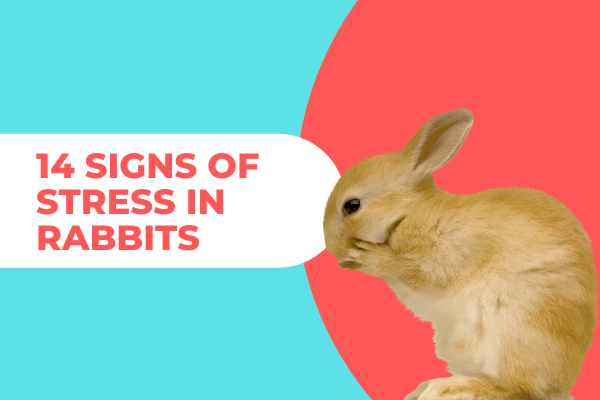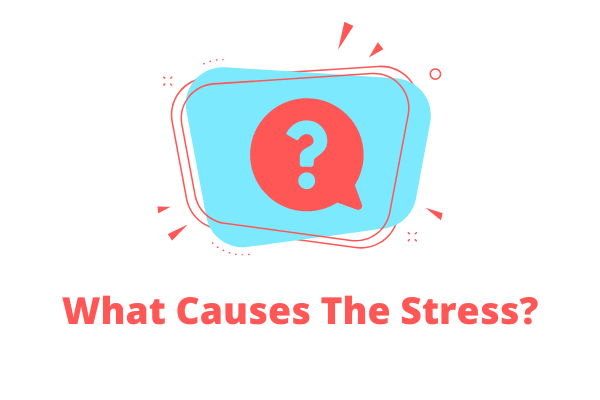How to know if your bunny is stressed? What are the signs of stress in rabbits? How to treat stress in rabbits? If you’re looking for answers to these common questions, we got you covered!
Rabbits are known to become stressed and anxious very quickly. These are very sensitive animals who can get easily affected even by the smallest change in their environment. Bunnies are defenseless and hence always fear their predators. If they sense any unusual thing around them, they will become stressed.

Stress can be very harmful for your rabbit. It can cause several health complications and in worse cases, it can even result in a life-threatening situation. So, it’s very important to keep your rabbit happy and stress-free.
The only good thing about stress is, it can be noticed through your rabbit’s unusual behavior and habits. In this article, we are sharing 14 common signs of stress in rabbits along with their causes and treatments.
The Main Signs of Stress In Rabbits
When bunnies are stressed, it reflects in their behavior. Apart from sleeping, the most common sign of stress is a bunny is curled up with paws tucked in and ears going flat. Heavy breathing can also be a major sign that something is wrong with your bunny.
Unlike other pets, bunnies react to stress in several different ways. It is extremely important to notice the unusual changes in their habits and behavior. Most of the time, you may notice your bunny running and hiding himself. While this is a normal rabbit-behavior, if it happens very often, you need to worry.
To help you keep your rabbit happy, here are the most common signs of stress in rabbits:
- 1. They Appear Nervous – Shivering, Curled Up With Paws Tucked In And Ear Going Down
The first and the most obvious sign of stress in rabbits is when they’re all curled up in their hiding location with ears flat and paws tucked in. Sometimes, rabbits do this during the extreme winters to keep themselves warm. But if you’re noticing this very often during normal days, it’s a sign that your bunny is stressed.
- 2. Bulging Eyes – Being Overly Active
We all know that bunnies are active animals. They don’t like sitting quietly at one place. Instead, they love hopping and running around your place. However, if your bunny is being overly active consistently, then know that he is stressed out. This includes running too much without taking rest, too much scratching and too much chewing.
- 3. Being Aggressive On Their Owner And Fellow Bunnies
If you’re a rabbit owner, you should know that these pets are very loving and non-violent. But when they are stressed out, they start getting aggressive on their parents and their fellow buddies. If this behavior becomes persistent, you need to take measures to calm your bunny down.
- 4. Rough Behavior When Handled
If your bunny is being aggressive with you even when you’re handling him with care, there are good chances that he’s not feeling well. This is especially true when it happens very often. At times, you might find this rude behavior annoying but instead of being rude on your poor pet, try to understand his situation and calm him.
- 5. Lack of Interest /Lethargy
As we’re already discussed in the second point, rabbits are active animals. They love playing, hoping and running around. But if your pet is sitting quietly at one corner and is not showing interest in his surroundings, he is stressed for sure. You may also notice that he’s not nibbling hay and not showing interest in its food.
- 6. Being Restless
Rabbits love sleeping. If you’re noticing that your rabbit is not sleeping well and staying restless, he needs to be taken care of. Restlessness involves moving here and there at sleeping time.
- 7. Staying Inactive /Over Sleeping
Yes, there is no doubt that rabbits love sleeping but if they’re sleeping too much, it’s a sign. Oversleeping means spending most of the sleeping and very little or even no activity. Apart from stress, oversleeping and lack of activity can also be a sign of other health complications. So, it’s very important to take your pet to his vet.
- 8. Running Away/Hiding
If your bunny is running away from you when you are trying to pat him or caress him, it’s not a good sign. Rabbits like to hide themselves when they’re comfortable in their surroundings. If your pet is showing this behavior, find the cause and cheer him up.
- 9. Breathing Heavily
Heavy breathing or panting is not very common to rabbits. If your pet breathing abnormally even when he isn’t involved in a lot of exercise, know what is bothering him. But before that, pat him gently and try to calm him down. In the later section, we will discuss how you can treat your stressed bunny. So, keep reading!
- 10. Not Eating Well
Bunnies love munching on hay and a variety of other food items. In fact, they show a keen interest in food, especially their vegetables. If you’re noticing that your bunny is not eating properly or eating very less food than usual, it’s a visible symptom of stress. Further, the reason behind stress could be some health complication.
- 11. Abnormal Pooping Habits
Normally, rabbits poop a lot. Their droppings are small, round, dry and odorless. But if your rabbit is not pooping well or suffering from constipation, he might be stressed. Further, if its poop is very runny, pasty or deformed, you should immediately see your vet.
- 12. Over-grooming
Rabbits love to keep themselves neat and tidy. You won’t find any dirt hanging on their fur and paws. But a stressed rabbit often tries to over-groom itself to an extent that it might hurt him.
- 13. Not Grooming At All
Continuing the above point, a stressed rabbit might also stop grooming itself. This mostly happens in the case of senior rabbits. If you’re noticing a poopy butt or dirty fur, this means your rabbit is not doing well.
- 14. Making Strange Noises
If your pet is making strange noises repeatedly, this could be due to stress. Rabbits are quiet animals and don’t make a lot of noises unless they’re in some problem. If you’re hearing such noises, find out the reason and cheer your buddy up.
Now that you know the common signs of stress in rabbits, now let’s move on to the causes behind it.
What Are The Causes Of Stress?
There are many different situations which can cause stress in your bunnies and it’s very important to learn about the main reasons behind it. By learning and understanding the causes of anxiety and stress, you can prevent such situations and treat your bunny before things get worse.
Below are the main causes of anxiety and stress in rabbits :

- 1. Being Locked In A Small Cage
While rabbits are small pets, they need enough space to hop and live happily. If they are confined or kept in a small cage with a very little space to move, they can become stressed. Besides stress, being confined can also result in anxiety and other health problems.
To a bunny, its cage is like its home. So, the cage should be large enough where they can stretch, hop and play freely.
Moreover, avoid locking your rabbits in the cage all the time. Make sure to give them a house tour or a walk several times a day. This will not only prevent stress, but will also keep your pets happy and healthy.
- 2. Sudden Changes In Their Environment
As mentioned earlier, rabbits are sensitive animals. They get scared by the slightest changes in environment. When their place is changed or if they’re shifted in a new house, they can become stressed.
Apart from that, rabbits can also show signs of stress if their owner is changed or not available. Yes, you’ve read it right. Rabbits do get attached with their owners, on contrary to a popular misconception that they don’t.
- 3. Improper Handling / Abrupt Gestures
Unlike cats and dogs, rabbits don’t react very well to the sudden gestures. When they’re handled in a rough way and if you use sudden gestures they have no idea of, they can become stressed.
Rabbits should be handled very gently and with uttermost care. You should always approach them slowly and allow them to come out of their cage and move on their own.
Due to improper handling, rabbits often become stressed around children. Obviously, kids don’t know how to handle the bunnies and how to behave around them. Sudden actions of kids can easily scare off the bunnies. Hence, either teach your kids about caring rabbits or don’t allow them to mishandle the pets.
- 4. Loud Noises And New Smells
As we’ve discussed, bunnies get used to their environment and once settled, they will continue to prefer to live that way. For example, if they live in a quieter place, any occasional loud noise can scare them. Similarly, new smells they’re not used to, can put them off. Loud noises include music, construction, traffic noises etc. And also, what is a normal sound for you can be very loud to your pet, so keep that in mind.
Coming to the new smells, they could include perfumes, room fresheners, disinfectants, odor from clean products etc.
We have discussed the common signs of stress along with several reasons behind that. Now, as promised, we are sharing some tips to treat your stressed rabbits.
How To Treat Stress
Don’t allow stress to impact your lovely pet. Even if your bunny finds a way and calms himself down, it may have long-term effects. For example, if your bunny becomes constipated, it will continue to discomfort him even when he’s calm. So, it’s very necessary to treat your pet in the right way and prevent stress from occurring.
Start your calming process verbally. In other words, use verbal cues to cool down your bunny. Try to speak to him in a soft, sweet and reassuring tone. You can even sing a soft melody in a very low voice. Make sure you’re not speaking in a loud and frustrated voice.

Take your bunny in your arms or simply sit down to their level and start communicating with them. Use short reassuring words like, “everything is alright”, “it’s ok”, “it’s me” etc. Use these words repeatedly whenever your bunny becomes stressed. This will imprint these words in their brain and they will understand that you’re calming them.
Don’t get too close to your bunny if he or she doesn’t entertain it. If they approach you by themselves, pet them gently and caress their body where they enjoy it. Meanwhile, also try to find out the cause of stress.
Once you’ve found the cause, start by taking immediate action against it. For example: if your bunny is stressed due to a loud noise or mishandling, try to quiet the noise and don’t allow anyone to get close to him or her, especially the kids.
Try to distract your stressed pet by indulging them into playing and exercising. Offer them a few toys and maybe their favorite food.
Avoid making any changes to the living area. Even if you’re planning for some advancements in your bunny’s quarter, introduce the changes slowly so your pet gets used to them.
Once your bunny gets back to their old self, don’t forget to offer their favorite treat.
Summary
Rabbits are sensitive, they get stressed very easily. The most common reasons behind stress can be a sudden change to their environment, loud noises, new smell, mishandling and ageing. Once you’ve noticed that your pet is stressed, don’t ignore it and take action straight away to calm them down. We have already discussed a few tips that you can use to treat your stressed bunny. Moreover, if the stress doesn’t go after some time, consider visiting your vet.